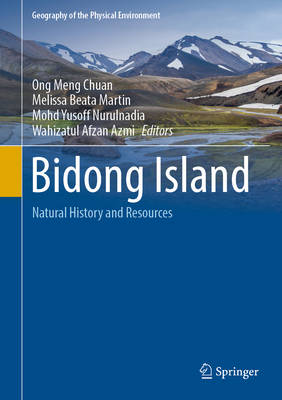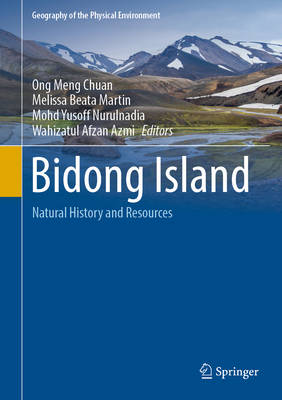
- Afhalen na 1 uur in een winkel met voorraad
- Gratis thuislevering in België vanaf € 30
- Ruim aanbod met 7 miljoen producten
- Afhalen na 1 uur in een winkel met voorraad
- Gratis thuislevering in België vanaf € 30
- Ruim aanbod met 7 miljoen producten
Zoeken
Bidong Island
Natural History and Resources
€ 147,95
+ 295 punten
Omschrijving
Bidong Island is a small island located in the South China Sea, and is about 14 km from mainland Peninsular Malaysia. The island and the Bidong archipelago boast of its richness in diversity of both terrestrial and marine organisms and its undeniably pristine and thriving ecosystem. In 1975-1990, Bidong Island was formerly a UNHCR refugee camp for a quarter of a million Vietnamese "Boat people" escaping the Vietnam War, and still holds great significance to many of its descendants. Due to its historical significance, the Terengganu State government plans to develop Bidong Island as a heritage tourism site and a new scuba diving destination.
This book highlights the uniqueness of Bidong Island and its archipelago, paying particular attention to the biological aspect (which includes marine and terrestrial organisms) and the pollution status surrounding the island. These mainly focus on organisms of the open water and benthic ecosystems such as plankton, fishes, corals reef communities, crustaceans and foraminifera. In addition, we discuss terrene related topics, which includes tree diversity, lichens and also herpetofauna surrounding the Bidong Island. Indisputably an important topic, we also address the pollution status surrounding Bidong Island, with emphasis on heavy metals and its impact.
Readers interested in the areas of environmental sciences should find this book appealing. This book can also be used by students and researchers when discussing about tropical environments on island ecosystems. We do hope that stakeholders that would partake in future interest of Bidong Island (particularly in tourism) are equally aware of the current health status of the island and would engage in conserving and sustaining the diversity and heritage of the archipelago for the benefit of the community.
This book highlights the uniqueness of Bidong Island and its archipelago, paying particular attention to the biological aspect (which includes marine and terrestrial organisms) and the pollution status surrounding the island. These mainly focus on organisms of the open water and benthic ecosystems such as plankton, fishes, corals reef communities, crustaceans and foraminifera. In addition, we discuss terrene related topics, which includes tree diversity, lichens and also herpetofauna surrounding the Bidong Island. Indisputably an important topic, we also address the pollution status surrounding Bidong Island, with emphasis on heavy metals and its impact.
Readers interested in the areas of environmental sciences should find this book appealing. This book can also be used by students and researchers when discussing about tropical environments on island ecosystems. We do hope that stakeholders that would partake in future interest of Bidong Island (particularly in tourism) are equally aware of the current health status of the island and would engage in conserving and sustaining the diversity and heritage of the archipelago for the benefit of the community.
Specificaties
Betrokkenen
- Uitgeverij:
Inhoud
- Aantal bladzijden:
- 227
- Taal:
- Engels
- Reeks:
Eigenschappen
- Productcode (EAN):
- 9783030919238
- Verschijningsdatum:
- 18/02/2022
- Uitvoering:
- Hardcover
- Formaat:
- Genaaid
- Afmetingen:
- 183 mm x 263 mm
- Gewicht:
- 689 g

Alleen bij Standaard Boekhandel
+ 295 punten op je klantenkaart van Standaard Boekhandel
Beoordelingen
We publiceren alleen reviews die voldoen aan de voorwaarden voor reviews. Bekijk onze voorwaarden voor reviews.










